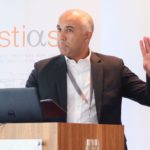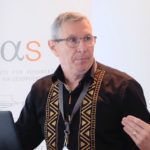The need for a more developmental, human-rights focused, displaced persons-centred, whole-of-government and socially transformative approach were some of the issues highlighted in this seminar presentation by STIAS fellows Marius Olivier of the Faculty of Law, Nelson Mandela University, Evance Kalula of the Faculty of Law, University of Cape Town, Avinash Govindjee of the Faculty of Law, Nelson Mandela University and Peter de Clercq of the School of Governance, University of the Witwatersrand. The group is looking at solutions to the challenge of climate-change displaced persons – including internal and cross-border displaced persons – specifically focused on the informal economy and Africa.
STIAS fellows Marius Olivier, Evance Kalula, Avinash Govindjee and visiting scholar,Peter de Clercq during their seminar on 21 September 2021
“Both internal and cross-border displacements have clear implications for health, livelihood and food security in Africa,” said Olivier. “It’s estimated that agricultural losses due to climate change could be as high as 22% by 2080, placing 75% of the population at risk of hunger. People move because they don’t have a choice. Many land up in the informal economy, having to rely on informal social protection. In Africa there are limited continental, regional and national instruments to protect them and thus far there have been very little other than humanitarian interventions. We have to ask to what extent we care for those who move and what we need to do to secure their position.”
“In a country like South Africa in which the informal economy already stands at an estimated 40%, these issues have profound implications,” added Evance Kalula.
The seminar focused on shortcomings in the response to these challenges. These include inadequate conceptual and policy approaches in relation to both displacement and social-protection responses; deficient governmental and protective interventions; and, a weak normative framework.
Olivier pointed out that there is no dedicated social-protection orientated legal framework for such displaced persons, that the framework usually relied on – that of the International Labour Organization – does not make specific provision for climate-change induced migration, and that refugee law does not provide the answer because cross-border displaced people are not, as such, regarded as refugees which means, in some cases, they are turned back by host countries.
Acknowledging that all of this is a “legal minefield” nationally and internationally, full of complex and contested issues and involving the interplay between immigration law and politics, Avinash Govindjee pointed out that in many African countries, including South Africa, “if such displaced persons want to claim social protection the courts look at this on a case-by-case basis”.
“It’s a fragmented reality at present without sustainable solutions. Climate change-induced migrants rarely enjoy basic human-rights protection under the national and international law framework, except in terms of humanitarian law. There is a need to overcome global reluctance, inform global understanding of a properly regulated regime and then to concretise and apply it.”
“However, the legal framework is only as important as it is implemented and owned by the state and society. It’s not adequate unless it translates into transformation of society,” said Kalula.
To date, the emphasis has been mostly on humanitarian assistance, including repatriation, local integration or resettlement.
“The response has mostly been from humanitarian actors with humanitarian funding,” said Peter de Clercq. “Globally, internally displaced people outnumber refugees by far but they don’t receive as much attention because the West is not as affected through international migratory streams.”
“For the past 25 years we have dealt with displacement in a compartmentalised way – it needs integration,” he added.
However, there are hopeful signs that the world is starting to take notice. De Clercq highlighted a United Nations report, presented in New York by the UN Secretary-General on 29 September which is the result of the work of a high-level panel convened in 2019 under the pressure of 60 Member States.
“The report highlights the need for national ownership and accountability, and the need for a developmental approach including looking at preventing displacement in the first place by reducing risks. It advocates a long-term view that sees displacement as part of societal change processes (including urbanisation and livelihood shifts) with action outlined in national development plans and as a fundamental part of development. This necessitates a focus on governance and the need for economic and socio-economic reintegration into society of displaced persons. But this will require shifts – seeing such people as citizens with rights, focusing on engagement rather than an exit strategy and moving beyond resource provision to socio-economic reintegration.”
“It recognises also that one size does not fit all – there is no standardised approach,” he added.
The group pointed to challenges that have not received enough attention including the fact that women often bear the brunt of such displacement both in terms of income generation and care provision; displacements usually involve urbanisation which means a change in how people make money as well as in their relationships to their neighbours and communities, and, that displacement may be a protracted experience – sometimes lasting 10 years or more – which has huge implications on actions. They argued that these factors mean that displacement solutions need to be integrated into the context of global urbanisation, spatial planning and human settlement as well as gender disparities.
“We need to empower communities, especially women, to take their fate into their own hands,” said De Clercq. “There needs to be a focus on societal transformation – on how societies change and how the solutions fit into the change.”
“Not a fire brigade approach, but investment in local structures,” he added. “States must lead the shift then the international community can invest differently in solutions.”
The group believes that diverse dimensions need to be factored in when designing appropriate policy and other responses –including the social-protection vulnerabilities experienced by affected persons and communities, the impact on host communities, the interplay with immigration law and policy, the need for labour-market interventions and the adoption of context-sensitive governance arrangements.
A new conceptual approach must acknowledge exposure to climate change as a particular social risk, and allow the development of an integrated social-protection response framework with an emphasis on the preventive, integrative, compensatory and transformative dimensions.
Human rights-centred responses to climate-induced migration should strengthen social-protection responses, with reference to environmental, property and land rights, fundamental rights to dignity, life, equality, work, food, water and housing, freedom and security of the person, access to justice, and effective remedies.
They concluded that social-protection responses, comprising social insurance, assistance and services provided by hosting countries, need to be reconsidered. Reliance on informal social protection as a fall-back for vulnerable persons does not provide meaningful protection and adjusting social-protection modalities targeted at workers in the informal economy need to be considered.
“Some experimental and innovation solutions exist already,” said Olivier. “In the past 10 to 20 years there has been a rapid expansion of social protection for those engaged in the informal economy, also by introducing more relaxed criteria, context-specific benefit arrangements and a more enabling environment.”
“A legal framework that has a human rights basis can support but must include a contextualised approach,” he said. “It must be sensitive to context, understand the different categories of people involved, and the sources leading to their exposure, as well as the monetary and non-monetary interventions needed.”
The project will result in a publication in the STIAS series. “Our aim is to not just to understand the situation but to build engaged scholarship,” said Kalula.
Michelle Galloway: Part-time media officer at STIAS
Photograph: Noloyiso Mtembu




